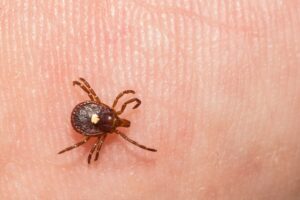August 18, 2025 | Black & Kletz Allergy

 Over the last 10-15 years, the number of individuals with meat allergy has risen mainly because of a condition called alpha-gal syndrome or mammalian meat allergy. Alpha-gal syndrome was first identified by Dr. Thomas Platts-Mills at the University of Virginia School of Medicine in 2002. He discovered that the syndrome originated from the bite of lone star ticks (Amblyomma americanum). Specifically, the IgE antibody (i.e., the allergy antibody) response to the mammalian sugar molecule known as alpha-gal was associated with a delayed-onset swelling (i.e., angioedema) and/or anaphylaxis 2 to 8 hours after eating mammalian food products, such as beef, lamb, pork, and/or venison.
Over the last 10-15 years, the number of individuals with meat allergy has risen mainly because of a condition called alpha-gal syndrome or mammalian meat allergy. Alpha-gal syndrome was first identified by Dr. Thomas Platts-Mills at the University of Virginia School of Medicine in 2002. He discovered that the syndrome originated from the bite of lone star ticks (Amblyomma americanum). Specifically, the IgE antibody (i.e., the allergy antibody) response to the mammalian sugar molecule known as alpha-gal was associated with a delayed-onset swelling (i.e., angioedema) and/or anaphylaxis 2 to 8 hours after eating mammalian food products, such as beef, lamb, pork, and/or venison.
Alpha-gal, officially referred to as galactose-alpha-1,3-galactose, is a carbohydrate (i.e., sugar molecule) that exists in most mammals (e.g., pigs, cows, deer, sheep, rabbits, whales). It is not found however in humans or non-mammals such as birds, reptiles or fish. Lone star ticks can transfer this alpha-gal carbohydrate molecule to humans by first biting and feeding on mammals and then biting humans. After someone is bitten by a lone star tick, the alpha-gal molecule, which is present in the tick’s saliva, is transmitted into the individual’s bloodstream. In turn, that person will produce IgE antibodies as a defense mechanism against this foreign carbohydrate molecule (i.e., sugar molecule). As a result, that person now has alpha-gal IgE antibodies present in their bloodstream. Going forward, after the sensitization to alpha-gal occurs, whenever that individual eats mammalian meat which naturally contains the sugar molecule galactose alpha-1,3-galactose (i.e., alpha-gal), their alpha-gal IgE antibodies will bind and react against the alpha-gal present in the mammalian meat (e.g., pork, beef, venison, lamb, rabbit, whale) and cause the person to exhibit allergic symptoms. The typical and more common symptoms experienced by someone with alpha-gal syndrome include hives (i.e., urticaria), swelling (i.e., angioedema) and/or anaphylaxis
There is also a newer variant of alpha-gal syndrome referred to as gastrointestinal (GI) alpha-gal. Gastrointestinal alpha-gal presents with GI symptoms such as nausea, vomiting, diarrhea and/or abdominal pain without the predominant skin, respiratory, or circulatory symptoms. It should be noted that there are IgE antibodies present on human mast cells that richly populate the gastrointestinal tract. In patients with the variant called gastrointestinal (GI) alpha-gal, as a result of the binding of the alpha-gal molecule with the IgE antibodies on the mast cells in the gastrointestinal tract, degranulation of the mast cells occur which causes the release of large amounts of histamine and other inflammatory chemical mediators into the bloodstream. These chemical mediators can in turn act on sensory nerve endings to cause the intestinal smooth muscles to cause contractions which produce pain as well as the mucous glands in the GI tract to produce more mucous. Note that these vague abdominal symptoms can be and often are confused with other gastrointestinal conditions such as irritable bowel syndrome (IBS) or classic food allergies. One way to differentiate between a common food allergy and alpha-gal syndrome is that onset of symptoms is typically several hours after the ingestion of the mammalian meat in patients who have alpha-gal syndrome. A history of waking up at night from sleep with gastrointestinal distress may suggest that the person has alpha-gal syndrome given the delay in symptoms that occurs in this condition. In individuals with classic food allergies, the abdominal symptoms usually occur fairly quickly after ingesting the offending food.
Diagnosis:
The diagnosis of alpha-gal syndrome begins by performing a comprehensive history and physical examination. The diagnosis is helped if there has been a recent tick bite, although it is not crucial to make the diagnosis as not all patients remember if they have had a recent tick bite. A blood test for alpha-gal antibody should be taken and laboratory findings are positive for the alpha-gal antibody in individuals with the condition. The diagnosis is often not made due to the fact that there is usually a time period between the tick bite and the advent of symptoms. Thus, the diagnosis is typically underdiagnosed. Note that the gold standard to diagnose regular IgE-mediated food allergies is the oral food challenge, but in the case of alpha-gal syndrome, the oral food challenge is unreliable since there is typically a delay in symptoms for several hours after the ingestion of mammalian meat.
Treatment:
Eliminating the consumption of all mammalian meat (e.g., beef, pork, venison, lamb, rabbit, whale) and mammalian products (e.g., milk, butter, lard) is the only way to manage this condition. Dairy products do contain smaller amounts of alpha-gal, particularly cream cheese, cream, and ice cream, cream, which have a high fat content. Gelatin is derived from the collagen in pig or cow bones. As a result, foods that contain gelatin (e.g., gelatin candies, gummy bears, marshmallows) may likewise trigger allergic reactions. Processed foods can also have small amounts of animal-derived products. Restaurants may cross-contaminate foods with alpha-gal which may be a problem for individuals with high levels of sensitivity to alpha-gal.
Prevention:
The treatment of alpha-gal syndrome is simply prevention. Patients with alpha-gal syndrome should take actions to avoid further tick bites because additional lone star tick bites may worsen the allergy. Checking regularly for ticks, showering soon after outdoor activities in grassy and woody areas, treating clothes and shoes with permethrin, and creating a barrier at the ankles by pulling up one’s socks over the pant cuffs when outside may all help reduce the likelihood of tick bites.
Certain medications such as cetuximab (i.e., Erbitux) and pancreatic enzymes are derived from pigs and may cause problems in individuals with alpha-gal syndrome. A company in Blacksburg, VA has developed alpha-gal-free pork, which is FDA-approved but not yet widely available. Another option for alpha-gal allergic individuals is to consume plant-based substitutes to meat commonly found in companies such as Beyond Meat or Impossible Burger.
All patients diagnosed with alpha-gal allergy should carry a self-injectable epinephrine device (e.g., EpiPen, Auvi-Q, Adrenaclick) or an epinephrine nasal spray (e.g., Neffy) for use in case of a systemic reaction following an unintended exposure to mammalian meat. If a self-injectable epinephrine device or an epinephrine nasal spray is used, the patient should go immediately to the closest emergency room.
The board certified allergy doctors at Black & Kletz Allergy have been diagnosing and treating allergies, asthma, sinus conditions, and immunological disorders for more than 5 decades. Black & Kletz Allergy has 3 convenient locations in the Washington, DC metro area with offices in Washington, DC, McLean, VA (Tysons Corner, VA), and Manassas, VA. We offer on-site parking at each location and the Washington, DC and McLean offices are Metro accessible. There is a free shuttle that runs between our McLean, VA office and the Spring Hill metro station on the silver line. Please call us today to make an appointment at the office of your choice. Alternatively, you can click Request an Appointment and we will respond within 24 hours by the next business day. The allergists at Black & Kletz Allergy pride themselves in delivering the highest quality allergy care in the Washington, DC metropolitan area in conjunction with providing excellent customer service in a welcoming and pleasant environment.












